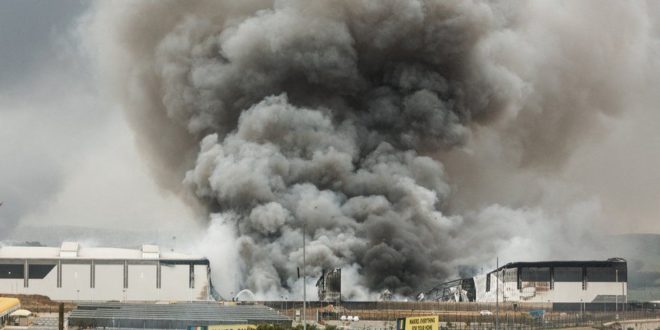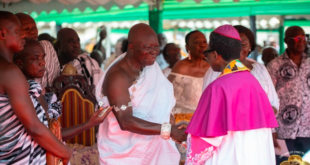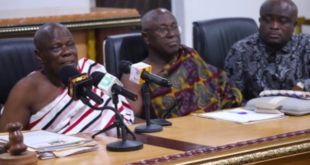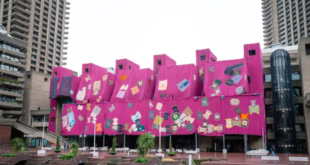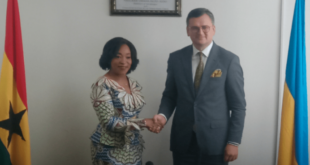One year after what South Africa’s President Cyril Ramaphosa called a violent “insurrection” that led to more than 300 deaths, the country is still wrestling with profound political and economic challenges and enduring fears of more unrest.
The black skeleton of a burnt-out chemical plant looms over the N2 motorway as it meanders through pale green sugar-cane fields just north of Durban.
At many intersections you can still see the scars and stains left by the burning barricades that spread, with chilling speed, across this coastal region exactly a year ago, accompanied by a near week-long frenzy of arson, looting, and murder.
Hundreds of shops, malls and businesses were destroyed. Thousands of people lost their jobs.
The cost to South Africa’s economy, according to an estimate cited by the president’s office, was $3.4bn (£2.8bn). It was the worst violence to hit this country since the arrival of democracy in 1994.
The chaos was allegedly triggered by political allies of the country’s disgraced former President Jacob Zuma, in reaction to his imprisonment for contempt of court.
Zuma still enjoys the support of a left-wing faction in the governing African National Congress (ANC) which has also been linked to the corruption that flourished during his presidency.
Zuma’s own children took to social media, urging rioters to “let everything burn”, and even advising them to loot “carefully and… responsibly”.
In its earliest stages, the violence and arson appeared carefully orchestrated and coordinated.
For a few, gut-wrenching days, it felt to many here as though this young democracy was sliding towards some kind of precipice.
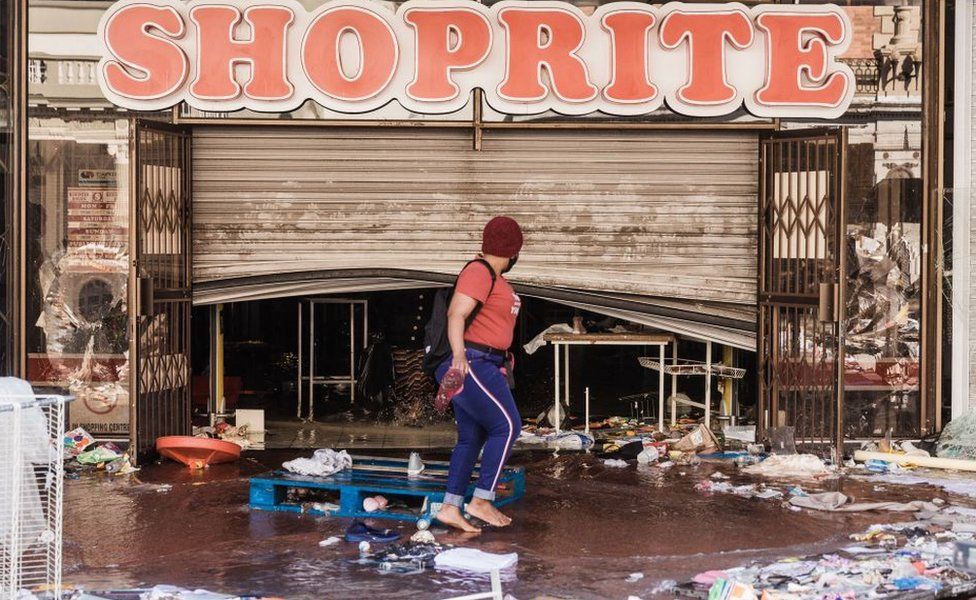
In the months since then, despite Covid and devastating local floods, there have been indications that the province of KwaZulu-Natal is bouncing back.
Businesses have reopened. Many shopping malls have been rebuilt. At least some tourists are returning to the Indian Ocean beaches.
“We South Africans are resilient,” says Brett Moran, who works for a private security company that helped protect the seaside town of Ballito during the unrest.
“But maybe we’re too resilient. We forget… too quickly,” he adds.
The idea of a country being “too resilient” might seem odd.
But it reflects South Africa’s extraordinary capacity to absorb and tolerate crises – including staggering levels of corruption, record-breaking unemployment, a culture of impunity, and widespread infrastructural collapse – without showing much apparent urgency about the need to change course.
Which is why, in communities around Durban and beyond, many people fear that last year’s unrest was not a one-off, and that the country may be sleepwalking into deeper trouble.
“This [unrest] is being organised by a disgruntled bunch from within the ANC. They still want Zuma to be president,” says Thulani Mthetwa, a community organiser in a poor informal settlement across the motorway from prosperous Ballito.
It was President Cyril Ramaphosa who, chillingly, diagnosed last July’s violence as “an attempt to provoke a popular insurrection” and as “a deliberate, coordinated and well-planned attack on our democracy” by elements within his own party.
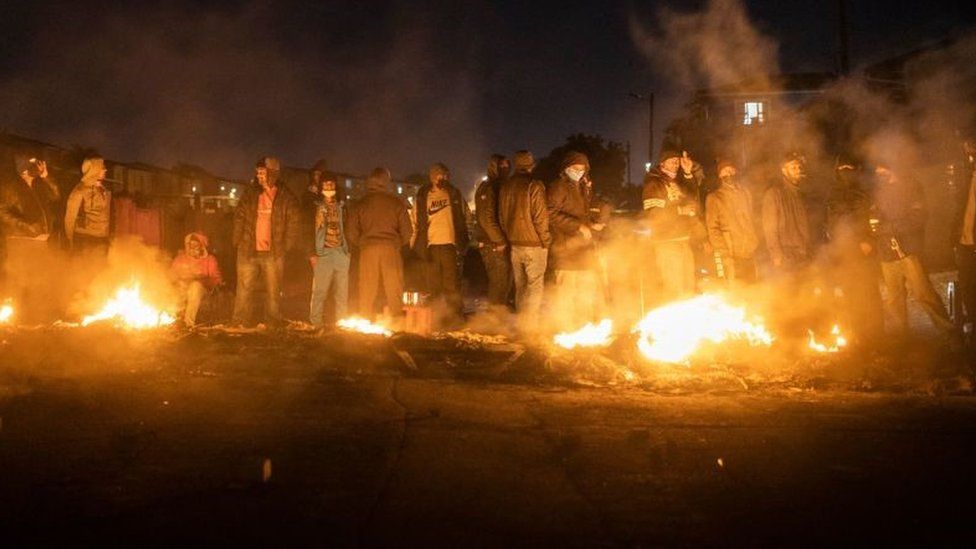 IMAGE SOURCE,AFP
IMAGE SOURCE,AFPThe failure of what the president saw as an uprising – largely due to local communities rallying to protect themselves and the deployment of thousands of soldiers – gifted him a valuable opportunity to seize the initiative and to strike back against the forces of chaos in South Africa.
One year on, how much progress has been made?
The encouraging news is that a years-long public inquiry into the corruption of the Zuma era recently delivered a damning assessment. It provided prosecutors with mountains of evidence for future cases.
The inquiry – known as the Zondo Commission – may yet be seen as a watershed moment, dramatically weakening the Zuma faction within the ANC, re-energising the fight against corruption and potentially freeing Mr Ramaphosa to push ahead with deeper reforms.
But there are reasons to be sceptical.
For a start, not a single prominent politician has been charged in connection with last year’s violence, most likely because the criminal justice system has been weakened by years of political meddling and mismanagement.
Many figures implicated by the Zondo Commission still hold powerful positions within the ANC as they seek to challenge internal disciplinary procedures for their own advantage.
“Nobody is going to be charged. South Africa has become desensitised,” says Phumzile van Damme, a former opposition MP and disinformation expert, now mulling a return to politics
“The state is collapsing. I think we’re moving fast towards collapse.”
Then there’s President Ramaphosa himself.
South Africa breathed a collective sigh of relief when the soft-spoken union leader turned businessman pushed the scandal-scarred Zuma out of office in 2018.
Mr Ramaphosa was widely viewed as a clean, principled figure, who could steer the ANC, and the country, away from the cliff’s edge.
But that early optimism is fading.
Some blame the president himself – accusing him of being too much of a consensus-builder, and too slow to crack heads and assert his authority.
Others point to a fresh political scandal, orchestrated by his enemies, but involving potentially serious questions about an alleged theft and cover-up at his private game farm, which could now threaten his grip on power. The president denies any wrongdoing.
But, for many here, the inescapable conclusion is a broader one – that the task of reforming a former liberation party that has been in power for nearly three decades is simply impossible.
“Cyril [Ramaphosa] is not the solution. People in the ANC know what reforms are required, but they can’t bring themselves to carry them out,” says Songezo Zibi, a prominent intellectual and political activist.
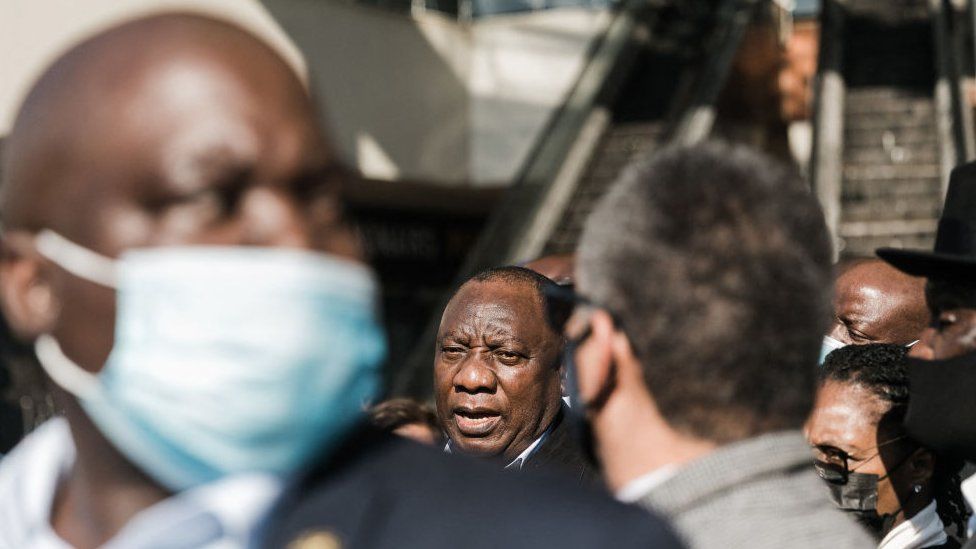 IMAGE SOURCE,AFP
IMAGE SOURCE,AFPAnd the ANC’s failings have now taken on an urgent new clarity for many South Africans.
BBC
 Home Of Ghana News Ghana News, Entertainment And More
Home Of Ghana News Ghana News, Entertainment And More
